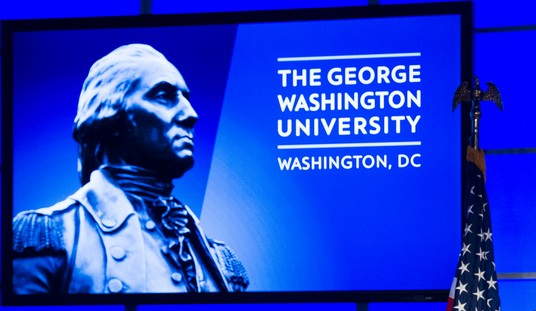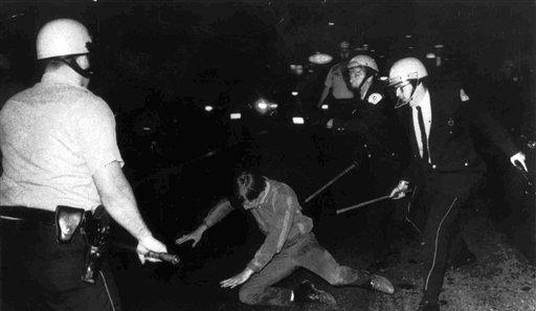Starting off with the above quote from Paulie on the Sopranos on how awful today feels, Jonah Goldberg told Hugh Hewitt this afternoon on his radio show:
One thing that he [Breitbart] and Bill [Buckley] shared was this basic contempt for the premise that the mainstream liberal elite institutions in the United States are in a position to judge and adjudicate the worth of conservatives. That they are in a position to judge our souls. That if we disagree with liberals, that proves that we are somehow wanting or lacking in compassion; lacking in humanity. That is a fundamental thing that enraged Andrew, this idea that if you disagreed about public policy, if you disagreed about how to organize society, that proved you were a racist. That proved you were a fascist. That proved you were a homophobe. It was the fundamental bad faith of the leading liberal institutions that controlled the commanding heights of this culture that infuriated him. And he refused, at the most basic level, to give them that authority over him or his ideas, and that is was fueled his Righteous Indignation, as his book title called it.
At National Review Online, former Breitbart colleague Michael Walsh describes Andrew as “the Right’s Achilles:”
In the war against the institutional Left, Andrew Breitbart was the Right’s Achilles; the bravest of all the warriors, now fallen on the plain. There was no combat in which he would not engage, no battle — however small — he would not join with glee, and no outcome acceptable except total victory. His unexpected death last night at the young age of 43 is not the end of his crusade, but its beginning.
No figure on our side was more despised in the whited sepulchers of the media/academic/political Left, and Breitbart wore their loathing as a daily badge of honor. His refusal to grant even a glimmer of moral absolution constantly enraged them, and his very existence was an affront to their carefully constructed — to use one of Andrew’s favorite words — “narrative” of moral superiority. Naturally, they are already dancing on his grave, with the manic joy of being suddenly and miraculously delivered from one of their most potent enemies.
Breitbart’s death is a tragedy, not only for those who delighted in following him into battle but for those who cheered him on as well. Andrew was larger than life, a charismatic natural leader, a big man in every way — physically, spiritually, and intellectually. He would meet a total stranger and immediately try to enlist him or her into his army, railing against the Left’s mendacity and misdeeds. He would practically pick you up by the lapels and shake you in order to make you understand the furious, urgent necessity of his fight.
Confrontation was his métier, and he routinely and gleefully waded into groups of lefties to challenge them face to face. Puckish humor was his stock-in-trade, and he would often disarm opponents with his boyish, goofy side. He was a virtuoso of the Twitterverse, a master of multi-tasking, and would think nothing of having a meeting with colleagues in his Westwood home while talking on the phone to someone else and working his Twitter feed. He joked that he had ADD, but what he really had was an outsized heart, fueled by courage and passion and, as the title of his recent book had it, by Righteous Indignation.
That indignation came to Breitbart in mid-life. A bluff Irishman who had been adopted as a baby by a Jewish couple in Brentwood (one of L.A.’s tonier neighborhoods), he moved to the right in college, at Tulane University in New Orleans, and crossed over completely with the Clarence Thomas hearings, which fueled his rage against the Left for their hypocritical treatment of American blacks. I can personally attest that no cause fired his righteous indignation more than the Left’s plantation attitude toward African-Americans.
Breitbart first made his mark on politics as Matt Drudge’s assistant on the influential Drudge Report, then honed his internet savvy by helping set up the Huffington Post — his impersonation of Arianna Huffington was uncannily spot-on — and, finally, created his collection of “Big” sites: Big Hollywood, Big Government, Big Journalism, and Big Peace. More “Bigs” were in the works.
As are more videos: “We Are Going to Release the Breitbart ‘Obama Harvard Tapes’ in One Week to 10 Days.”
Update: At Reason, Matt Welch adds:
He was genuinely, convincingly, overwhelmingly outraged at the workaday biases of liberal media, academia, and entertainment, and always positioned himself smack dab in the center of it. He’d be in the middle of some hilarious story about trying to do unspeakable things at some Irvine Meadows concert in the 1980s, and then if the conversation got steered toward the media, his eyes would narrow and redden, his face would go purplish, and Breitbart-Hulk would take over. Here’s how I described one such face-reddening moment in a 2004 Reason column:
“Every day I wake up in the battle about media bias,” he says. “The best analogy I can give to you is this: Have you ever gone to like the Santa Monica Pier, and seen one of those holograms on the wall, and you’re supposed to stare at it for a while, and there’s supposed to be, like, a magical castle in it? Well you look and you look and you can’t see that castle and you can’t see that castle, but eventually your eyes focus in such a way that the castle comes up. And then you can’t not see the castle. That’s how media bias comes to you from the conservative angle.” […]
“Because you ignored us,” Breitbart says, “because you ignored Rush and Drudge and God knows who else, we decided to go out and create our media. And I think that what we’re doing is building up something that may be bigger and better.”
Before talking about that “go out and create our media” part, which will be Breitbart’s true legacy, I would like to stress here that Andrew’s broader point about media bias, while always hyperbolic, was also based on something broadly true. Here, let’s look at something I read this very morning in The New Yorker, by Hendrik Hertzberg. In a piece that listed first among the Republican base’s “basest biases” its “fierce hatred of the mainstream media,” Hertzberg, the lead political commentator in the country’s most journalistically respected magazine, describes the GOP core like this:
an excitable, overlapping assortment of Fox News friends, Limbaugh dittoheads, Tea Party animals, war whoopers, nativists, Christianist fundamentalists, à la carte Catholics (anti-abortion, yes; anti-torture, no), anti-Rooseveltians (Franklin and Theodore), global-warming denialists, post-Confederate white Southrons, creationists, birthers, market idolaters, Europe demonizers, and gun fetishists
I was a “media columnist” when I met Andrew, and I will probably always disagree with the conservative/Breitbartian conflation of “bias” with “agenda,” but he certainly sensitized me more to the friction that non-liberals feel when swimming against the current of Acceptable Opinion. For which he deserves a posthumous thanks.
As Welch writes, “The next Breitbart-hater to match his entrepreneurial esprit-de-corps will be the first.”
Update: “The Five Alarm Firebell Falls Silent.” Jonah’s encomium to Andrew is now online.
More: “So many people like Aleister had the same experience: “I can’t believe I’m talking to Andrew Breitbart,” Stacy McCain writes, linking to blogger Aleister G. “And now they all have the same painful feeling: ‘I can’t believe I’ll never talk to Andrew Breitbart again.'”
Late Update: Welcome to those readers down under clicking in from Andrew Bolt of Australia’s Herald Sun.









Join the conversation as a VIP Member